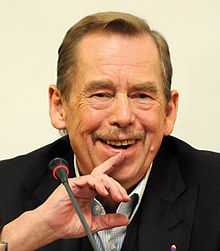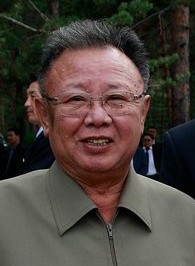The Western news media reacted to the deaths of two international figures, Czech Vaclav Havel and North Korean Kim Jong-il, by presenting comic-book cut-outs of the two men, following simplistic story lines that missed the more nuanced reality, writes Danny Schechter.
By Danny Schechter
The world has said goodbye to two leaders who were worlds apart. One was a widely celebrated anti-communist, the other a widely despised communist. However, the lives and thoughts of both the Czech Republic’s Vaclav Havel and North Korea’s Kim Jong-il were given short-shrift.
Havel, the playwright-turned-politician who parlayed human rights activism into becoming Czechoslovakia‘s post-Communist president, was a leader for the pro-democracy Charter 77 Movement, not just a Red-hating politician on a power trip. Yet, the press praised him more for what he opposed than what he believed. The people who loved him adored him for both.
One report: “Thousands of silent mourners have accompanied the body of Vaclav Havel through central Prague as the Czech Republic began three days of national mourning for the icon of the Velvet Revolution. About 10,000 mourners mostly in black, some carrying Czech or Slovak flags, joined a solemn procession taking the former president’s coffin from a church through narrow cobbled streets to Prague Castle, the seat of Czech presidents, on Wednesday.”
Havel was an intellectual, a non-violent revolutionary who also presided over the break-up of his country into two: the Czech Republic and Slovakia. When his era ended, amidst deep economic problems, his country opted to turn right abandoning his humanistic sensibility by embracing American-style aggressive capitalism.
Vaclav Klaus, Havel’s rigid “free market”-promoting adversary, was often hyper-critical of Havel when he was alive, but is now more charitable following Havel’s death, saying:
“Vaclav Havel’s life mirrors a large section of the 20th century: the war, the seizing of power by the communists, the thaw of the 1960s, the fall of communism, the building of the new democracy, the partition of the nation and its integration into European and global bodies.”
On Friday, there will be a procession of Western leaders showboating at his funeral including Bill and Hillary Clinton and leaders from Europe and Eastern Europe. Since his ascendancy to power, the Czech market was opened wide to western investment and military sales.
Havel had closer relations with American cultural figures including Frank Zappa and poet Alan Ginsberg than the neo-cons in Washington. Still, not every Czech was enamored with Havel either, for other reasons, as expressed by “Smoker X” on the Hyperspace website:
“If he knew what was gonna come, he would never do it. The things he promised he would do for Czechoslovakia never happened. I lived under the dictatorship as you call it in Czechoslovakia and I say that people were much happier then. The system was pro-people; this system we live now is against people and pro a few rich bastards.
“Socialism was not perfect but capitalism is pure evil.
“The things you say about Havel are things you heard from tv or newspaper. He did not liberate people in Czechoslovakia, he put them in prison. I would go back to socialism tomorrow if it was possible. you have no idea how good it was to live free, free from stress, hunger. always helped when needed, always guaranteed with work and free health care and education and good education.”
David Warren refutes media cliches about Havel in The Ottawa Citizen:
“Reading and re-reading Havel, since his death, I am struck by his acute grasp of the emptiness and capitulation of that Enlightenment. Soviet Communism embodied it in perhaps its most extreme form, but as Havel realized, western ‘capitalism’ and ‘libertarianism’ are also premised on Enlightenment tenets: that man constructs meaning for himself, and is answerable to himself, only; that what cannot be precisely defined, quantified, and legislated is ‘irrational,’ and ‘irrelevant’ to public life.”
Havel was embraced by the West only as a Cold War anti-communist symbol. The nuances of his philosophy and social critique were ignored. This is not a view you see reported in the Western media.
North Korea’s Leader
A world away, there were millions in tears to mourn the passing of North Korea’s Kim Jong-il. Few Western leaders have expressed condolences even though South Korea and Japan had the compassion to do so.
The Chicago Tribune reports, “North Korea claimed Kim’s death generated a series of spectacular natural phenomena, creating a mysterious glow atop a revered mountain, cracking a sheet of ice on a lake with a loud roar and inspiring a crane to circle a statue of the nation’s founder before perching in a tree and drooping its head in sorrow.”
If he was revered at home with these exaggerated powers, he was just as demonized one-dimensionally abroad. In death as in life, he was presented only as the two-bit dictator of “the Hermit Kingdom” who wore elevator shoes and had a big collection of western movies. How many times have you heard that! That’s about all we heard endlessly. Insult after insult.
Despite the constant characterizations of him as bizarre and a maniac, State Department officials who accompanied former Secretary of State Madeline Albright on a visit there told the New York Times how impressed they were with his strategic thinking and how well informed he was.
The West saw him, through the lens of our media, only as the embodiment of a hateful communism, stereotyping him as an enemy to be feared, as someone who likely would have been overthrown years ago if he did not have a few nuclear bombs.
Like Havel, his views were simplified, but in another direction. He was pictured as the evil villain in a James Bond movie ironically, he had collected them all and his country was the poster child of George W. Bush’s overhyped “Axis of Evil.” In the end, Bush did not prevail in his attack on Kim.
In a news world of black and whites, Kim was long blamed for every problem in the country. Yes, the people there are poor, suffer from famine and underdevelopment. They do need help, but refuse it at the expense of their independence and ideology.
But have we already forgotten the many decades when South Korea had a U.S.- backed dictator who had collaborated with the Japanese war machine? He was hated by “his” people who protested for years against him, even as the Pentagon backed him and Western investors profited from the economy.
The oxymoron of Western “intelligence” was caught napping when Kim died. Fears of his son the “Grand Successor” launching a war turned out to be bogus, too. Remember the breathless reports about the U.S. and South Korean militaries “on alert?” However, the transition there went smoothly, and within a few days, we learned that his power will be shared with the country’s bureaucratic military establishment. Kim #3 is on a tight leash.
That proved once again how little our media knows about the country and its history of defeating Japanese invaders and frustrating (with Chinese help) an American “police action” under the umbrella of the UN. In our official Cold War narrative, the Korean conflict was blamed solely on a North Korean invasion on June 25, 1950. In those years, the legendary journalist I.F. Stone refuted Washington’s fabricated Korea War propaganda.
Since then, historians like the University of Chicago’s Bruce Cumings have shown how the North Koreans were provoked and the conflict’s causes were complex. The North Koreans are said to have lost a million people in that war, but the country survived.
The people there may not have the “rights” we think we do, but they certainly seem to support their government and system even as human rights abuses are legion and dissidents expose Pyongyang’s policies.
So, there is more, much more, to the stories of both Kim and Havel, two men with opposing political orientations, but whose views and roles have been simplified and distorted for myth-making political purposes in our “objective” media.
Filmmaker and News Dissector Danny Schechter writes the NewsDissector.com blog. His latest book, Occupy, collects his dissections of Occupy Wall Street. For more information and to comment, write dissector@mediachannel.org



Havel supported that 2003 Iraq war. That’s a big problem for his legacy.